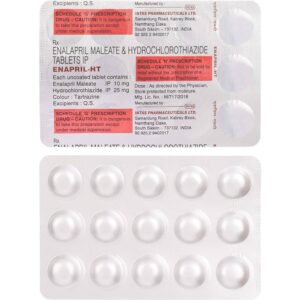ENALAPRIL + HYDROCHLOROTHIAZIDE
Enalapril: Enalapril is a medication classified as an angiotensin-converting enzyme (ACE) inhibitor. It is primarily used to treat high blood pressure (hypertension) and heart failure. Enalapril is available in tablet form and is typically taken orally once or twice a day.
The drug works by blocking the action of an enzyme called ACE, which is responsible for converting angiotensin I to angiotensin II. Angiotensin II is a hormone that causes blood vessels to constrict, leading to an increase in blood pressure. By inhibiting ACE, enalapril reduces the production of angiotensin II, relaxing and widening blood vessels, thus lowering blood pressure.
The dosage of enalapril varies depending on the condition being treated. For hypertension, the usual starting dose is 5 mg once a day, which can be increased up to a maximum of 40 mg per day. For heart failure, the initial dose is usually 2.5 mg once daily and gradually increased to a maintenance dose of 20 mg daily. The dosage may be adjusted by a healthcare professional based on individual response and medical history.
Like any medication, enalapril can have side effects. Common side effects include dizziness, headache, cough, fatigue, and low blood pressure. Some people may experience more serious side effects such as allergic reactions, swelling of the face or limbs, difficulty breathing, chest pain, irregular heartbeat, or kidney problems. It is important to notify a healthcare professional if any of these side effects occur.
Enalapril may interact with other medications, including diuretics, potassium supplements, nonsteroidal anti-inflammatory drugs (NSAIDs), and certain antidepressants. It is essential to inform a healthcare professional of all medications being taken to avoid potential interactions.
Enalapril is contraindicated in pregnant women as it may harm the fetus. It is also not recommended for individuals with a history of angioedema (rapid swelling beneath the skin) or those who are hypersensitive to ACE inhibitors.
Overall, enalapril is an ACE inhibitor commonly used to treat hypertension and heart failure. It lowers blood pressure by relaxing and widening blood vessels. By inhibiting ACE, enalapril reduces the production of angiotensin II, a hormone that constricts blood vessels. While generally well-tolerated, it is essential to be aware of potential side effects and discuss any concerns with a healthcare professional.
Hydrochlorothiazide: Hydrochlorothiazide is a medication classified as a diuretic, specifically a thiazide diuretic. It is primarily used to treat high blood pressure (hypertension) and edema (fluid retention) in conditions such as congestive heart failure, kidney disorders, and liver cirrhosis.
The mechanism of action of hydrochlorothiazide involves increasing the excretion of sodium and water by the kidneys. It does so by inhibiting the reabsorption of sodium ions from the tubules in the kidneys. By increasing the excretion of sodium and water, hydrochlorothiazide helps reduce the volume of blood circulating through the body, resulting in a decrease in blood pressure.
The typical starting dose of hydrochlorothiazide for hypertension is 12.5 – 25 mg once daily. The dose may be increased up to 50 mg per day if necessary. The exact dose and duration of treatment will depend on individual factors and should be determined by a healthcare professional.
Some common side effects of hydrochlorothiazide include increased urination, dizziness, headache, nausea, vomiting, loss of appetite, muscle cramps, and low levels of potassium in the blood (hypokalemia). It is important to monitor potassium levels periodically, as low potassium levels can lead to muscle weakness, irregular heartbeat, and other complications. In some cases, hydrochlorothiazide may also cause allergic reactions, skin rash, photosensitivity, and electrolyte imbalances.
As with any medication, hydrochlorothiazide may interact with other drugs, so it is essential to inform your healthcare provider about all the medications you are taking. Individuals with a history of kidney disease, liver disease, gout, diabetes, and certain electrolyte imbalances should use hydrochlorothiazide with caution and under close medical supervision.
Overall, hydrochlorothiazide is a widely used and effective medication for the treatment of high blood pressure and edema. However, its use should always be carefully monitored by a healthcare professional due to its potential side effects and drug interactions.

